
The Nation was an Irish nationalist weekly newspaper, published in the 19th century. The Nation was printed first at 12 Trinity Street, Dublin from 15 October 1842 until 6 January 1844. The paper was afterwards published at 4 D'Olier Street from 13 July 1844, to 28 July 1848, when the issue for the following day was seized and the paper suppressed. It was published again in Middle Abbey Street on its revival in September 1849 until 1900, when it merged with the Irish Weekly Independent.

The Irish Republican Brotherhood was a secret oath-bound fraternal organisation dedicated to the establishment of an "independent democratic republic" in Ireland between 1858 and 1924. Its counterpart in the United States of America was initially the Fenian Brotherhood, but from the 1870s it was Clan na Gael. The members of both wings of the movement are often referred to as "Fenians". The IRB played an important role in the history of Ireland, as the chief advocate of republicanism during the campaign for Ireland's independence from the United Kingdom, successor to movements such as the United Irishmen of the 1790s and the Young Irelanders of the 1840s.

William O'Brien was an Irish nationalist, journalist, agrarian agitator, social revolutionary, politician, party leader, newspaper publisher, author and Member of Parliament (MP) in the House of Commons of the United Kingdom of Great Britain and Ireland. He was particularly associated with the campaigns for land reform in Ireland during the late 19th and early 20th centuries as well as his conciliatory approach to attaining Irish Home Rule.

John Blake Dillon was an Irish writer and politician who was one of the founding members of the Young Ireland movement.

Daniel Desmond Sheehan, usually known as D. D. Sheehan was an Irish nationalist, politician, labour leader, journalist, barrister and author. He served as Member of Parliament (MP) in the House of Commons of the United Kingdom of Great Britain and Ireland representing Mid-Cork from 1901 to 1918, a constituency comprising the districts of Ahadallane, Ballincollig, Ballyvourney, Blarney, Coachford, Farran, Inchigeelagh, Macroom, Millstreet and Shandangan. As co-founder and President of the Irish Land and Labour Association, he was credited with considerable success in land reform, labour reforms and in rural state housing. From 1909, he was General Secretary of the Central Executive of the All-for-Ireland League, favouring a policy of National reconciliation between all creeds and classes in Ireland. During World War I he served as Irish regiments officer with the 16th (Irish) Division in France, 1915–16. He resigned his parliamentary seat in 1918 and lived in England for several years, returning to Dublin following the ending of the civil war, when he was appointed editor of the Dublin Chronicle.
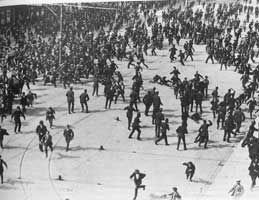
The Dublin lock-out was a major industrial dispute between approximately 20,000 workers and 300 employers that took place in Dublin, Ireland. The dispute, lasting from 26 August 1913 to 18 January 1914, is often viewed as the most severe and significant industrial dispute in Irish history. Central to the dispute was the workers' right to unionise.

William O'Brien was a politician and trade unionist in Ireland. While rarely dominating the political spotlight, O'Brien was incredibly powerful and influential behind the scenes, maintaining a firm grip over Ireland's trade unions for many decades. Besides his leadership in the trade unions, O'Brien was a founder, alongside James Larkin and James Connolly, of the Labour Party of Ireland. In later years a rift formed between Larkin and O'Brien that would last the rest of their lives and often divide the labour movement in Ireland.

James Stephens was an Irish Republican, and the founding member of an originally unnamed revolutionary organisation in Dublin. This organisation, founded on 17 March 1858, was later to become known as the Irish Republican Brotherhood (I.R.B).

The Irish Land and Labour Association (ILLA) was a progressive movement founded in the early 1890s in Munster, Ireland, to organise and pursue political agitation for small tenant farmers' and rural labourers' rights. Its branches also spread into Connacht. The ILLA was known under different names—Land and Labour Association (LLA) or League (LLL). Its branches were active for almost thirty years, and had considerable success in propagating labour ideals before their traditions became the basis for the new labour and trade unions movements, with which they gradually amalgamated.

Patrick O'Donoghue (1810–1854), also known as Patrick O'Donohoe or O'Donoghoe, from Clonegal, County Carlow, was an Irish Nationalist revolutionary and journalist, a member of the Young Ireland movement.
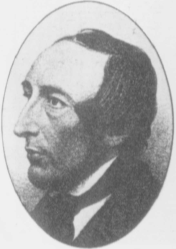
John Martin was an Irish nationalist activist who shifted from early militant support for Young Ireland and Repeal, to non-violent alternatives such as support for tenant farmers' rights and eventually as the first Home Rule MP, for Meath 1871–1875.

Charles Joseph Kickham was an Irish revolutionary, novelist, poet, journalist and one of the most prominent members of the Irish Republican Brotherhood.

Thomas Devin Reilly(Tomás Damhán Ó Raghailligh) was an Irish revolutionary, Young Irelander and journalist.
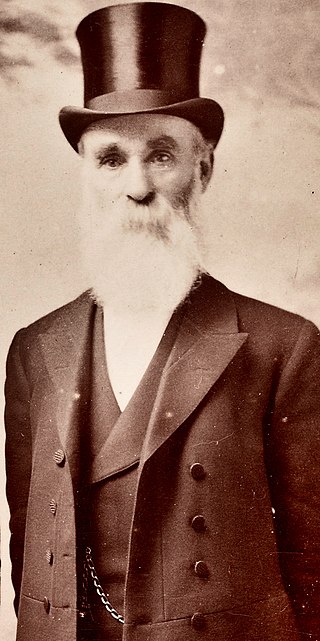
James Francis XavierO'Brien was an Irish nationalist Fenian revolutionary in the 1860s. He was later elected to the House of Commons of the United Kingdom of Great Britain and Ireland, as a Member of Parliament (MP) in the Irish Parliamentary Party.

Thomas Clarke Luby was an Irish revolutionary, author, journalist and one of the founding members of the Irish Republican Brotherhood.
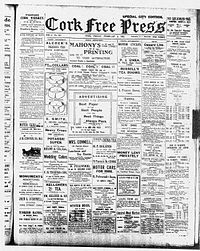
The Cork Free Press was a nationalist newspaper in Ireland, which circulated primarily in the Munster region surrounding its base in Cork, and was the newspaper of the dissident All-for-Ireland League party (1909–1918). Published daily from June 1910 until 1915, and weekly in 1915–16, it was the third of three newspapers founded and published within a decade by William O'Brien MP. It developed a unique approach to the national question and to the social issues of the day, with a pronounced conciliatory view to achieving Home Rule for the whole of Ireland. It displayed a favourable attitude towards the Sinn Féin movement. Its main rival newspapers were the Cork Examiner and the Freeman's Journal.

Patrick Thomas Daly, known as P. T. Daly was an Irish trade unionist and politician.
Desmond Ryan (1893–1964) was an Irish writer, historian, and in his earlier life a revolutionary in Sinn Féin.

The United Irishman/An tÉireannach Aontaithe, first published in May 1948, under Michael Traynor, was the official monthly organ of Sinn Féin sold by its members. After the split in the Irish Republican Movement, the title continued as the organ of Official Sinn Féin, being published from the offices in 30 Gardner Place in Dublin, with the Provisional wing publishing An Phoblacht. The first editor was Seán G. O'Kelly based in an office in 38 South King Street in Dublin. The historian Éamonn MacThomáis edited the paper for a short while prior to the 1970 split in Sinn Féin. Other editors of the paper included Seán Cronin, Seán Ó Brádaigh (1958–1960), Ruairí Ó Brádaigh, Eoin Ó Murchú, Jackie Ward, Seamus Ó Tuathail, Denis Foley and Tony Meade (1967). Contributors to the paper included Eamon McCann, Roy Johnston, Eamon Smullen, Eoghan Harris and Sean Garland. The United Irishman was replaced with The Irish People and the Workers' Weekly in 1980.
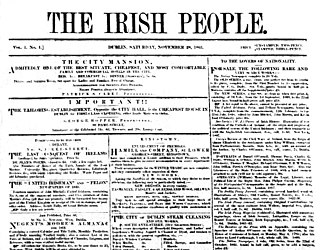
The Irish People was a nationalist weekly newspaper first printed in Dublin in 1863 and supportive of the Fenian movement. It was suppressed by the British Government in 1865.

















